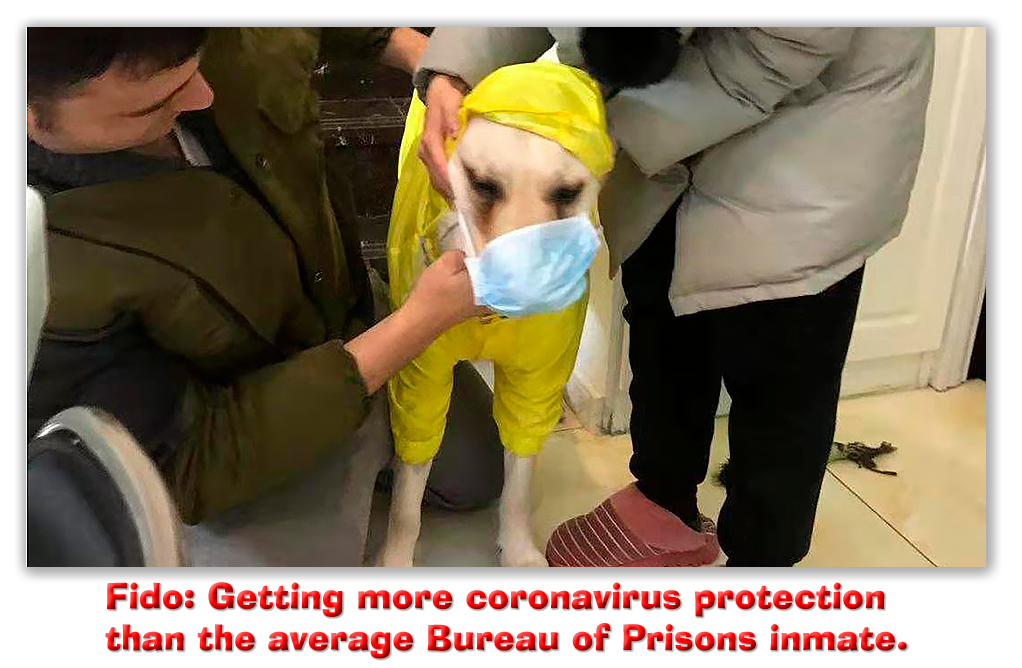We post news and comment on federal criminal justice issues, focused primarily on trial and post-conviction matters, legislative initiatives, and sentencing issues.

CORONAVIRUS TSUNAMI THREATENS PRISON SYSTEM
A week ago, the United States had 3,500 confirmed COVID-19 cases, with 40 deaths. A scant seven days later, those numbers have increased by an order of magnitude: the nation has just passed 35,000 confirmed cases – including several members of Congress – and 413 deaths. And although some local and state governments are releasing thousands of inmates in order to prevent a coronavirus outbreak in crowded jails and prisons, there is no federal move to do so.
As of last night, The Wall Street Journal reported, the Bureau of Prisons had confirmed three staff and three inmate cases. One of the BOP staff members who is presumed positive worked at a New Hampshire facility and may have been in contact with inmates, a BOP official told CBS News. The BOP only admits to one staffer at its offices in Grand Prairie, Texas (no prison there), one at USP Leavenworth (who, the BOP states, had no inmate contact), and one at FCI Yazoo City, Mississippi. The inmates are allegedly at MDC Brooklyn and FCI Oakdale II, Louisiana.
But despite inmate rumors to the contrary (and there are a lot of them), the BOP is not using its furlough power, its home confinement placement policies under 18 USC § 3624(c)(2), the Elderly Offender Home Detention program under 34 USC §60541(g), or ability to recommend compassionate release under 18 USC § 3582(c)(1)(A) to speed the release of vulnerable inmates.
And it’s not for lack of pressure: Last week, the ACLU called on Attorney General William Barr to “immediately seek sentences consistent with retroactive application of provisions of the First Step Act, including the 851 enhancement, safety valve, and 924(c) “stacking” provisions.” The ACLU demanded that BOP increase use of compassionate release for those over 65, have a medical condition; or who suffer from diseases making them vulnerable to the COVID-19 disease, and people within a year of release.
On Thursday, the Federal Public & Community Defenders asked DOJ to direct the BOP to grant the maximum amount of home confinement and to expand its reasons for recommending compassionate release to include risks of coronavirus to “identified persons over the age of 60, as well as persons with diabetes, respiratory problems, and compromised immune systems as facing special danger from COVID-19.”
Inmate rumors that the BOP will release minimum security inmates were stoked last night when President Trump said the White House is considering issuing an executive order to release elderly, nonviolent offenders from federal prisons amid the coronavirus pandemic.
“We have been asked about that, and we’re going to take a look at it. It’s a bit of a problem,” Trump told reporters at a White House news conference. “But when we talk about totally nonviolent, we’re talking about these are totally nonviolent prisoners, we’re actually looking at that, yes.”
The President said no more on the subject than that, and readers should be cautioned that the President has made similar statements previously (such as having a list of 3,000 people for clemency) that have not ripened into action.
Last week, inmates were buzzing about a petition posted at the website change.org, demanding that President Trump order all BOP campers be sent to home confinement for the duration of the COVID-19 emergency. As of this morning, the petition had over 39,000 signatures.
 Inmates face substantial risks due to the tight spaces in crowded conditions and strained health-care systems, according to experts. An opinion column in The New York Times last week warned that prisons and jails would be “the epicenter of the pandemic” unless action was taken. A similar column in The Washington Post warned, “Unless government officials act now, the novel coronavirus will spread rapidly in our jails and prisons, endangering not only prisoners and corrections workers but the general public as well.”
Inmates face substantial risks due to the tight spaces in crowded conditions and strained health-care systems, according to experts. An opinion column in The New York Times last week warned that prisons and jails would be “the epicenter of the pandemic” unless action was taken. A similar column in The Washington Post warned, “Unless government officials act now, the novel coronavirus will spread rapidly in our jails and prisons, endangering not only prisoners and corrections workers but the general public as well.”
“We’re all headed for some dire consequences,” The Wall Street Journal quoted Daniel Vasquez, a former California warden, as saying. “I think it’s going to be impossible to stop it from spreading.”
CBS News reported Thursday that BOP employees say their lives are in danger after bungled instructions and widespread supply shortages. “The agency is in chaos,” CBS quoted Joe Rojas, regional vice president of a correctional officer labor union, as saying. “We are just scrambling to get things in order.” At a Florida FCI, BOP staffers told CBS News that officers transferring inmates lack access to protective gear, soap, and hand sanitizer. Gloves are in short supply, and workers plan to reuse disposable masks.
“Our supply is very limited,” Kristan Morgan, vice president of an officers’ union, told CBS. “It’s kind of like survival of the fittest at this point.” She said she spent Tuesday afternoon admitting a busload of 12 new inmates, all of whom had high fevers. The facility’s doctor is out sick, and their two nurses and one nurse practitioner are working around the clock. BOP staff have started to call in sick in order to avoid exposure. “They feel really betrayed,” said union president Ray Coleman said.
A BOP spokesperson told CBS everything was fine. Cleaning, sanitation and medical supplies at federal prisons had been inventoried as part of the bureau’s pandemic influenza contingency plan, she said, and “an ample amount of supply is on hand and ready to be distributed or moved to any facility as deemed necessary… The Bureau of Prisons is prepared to address any supply concerns if necessary.” Uh-huh.
 Inmate COVID-19 fears do not much impress government prosecutors. Federal prosecutors argued in an SDNY felon-in-possession case that being locked up was probably safer than being free. Jail is “by its very nature isolated from the outside world,” they said, opposing a request for home confinement by Clifford Taylor, who is currently in MCC New York awaiting trial. The government said Taylor had not shown that the apartment of his children and mother, where he asked to be allowed to stay, would be any safer from the virus.
Inmate COVID-19 fears do not much impress government prosecutors. Federal prosecutors argued in an SDNY felon-in-possession case that being locked up was probably safer than being free. Jail is “by its very nature isolated from the outside world,” they said, opposing a request for home confinement by Clifford Taylor, who is currently in MCC New York awaiting trial. The government said Taylor had not shown that the apartment of his children and mother, where he asked to be allowed to stay, would be any safer from the virus.
Wall Street Journal, Jails Release Prisoners, Fearing Coronavirus Outbreak (Mar 22)
CNN, President Trump says he is considering an executive order freeing elderly nonviolent federal prisoners (Mar. 22, 2020)
Wall Street Journal, Trump Shuns Use of Law Allowing Control Over Manufacturers (Mar. 23)
ACLU, Letter to DOJ and BOP On Coronavirus And The Criminal Justice System (Mar 18)
Federal Public & Community Defenders Legislative Committee, Letter to Attorney General William Barr (Mar 19)
Change.org, Home-confinement to lessen Camper’s exposure to the deadly COVID-19 virus (Mar 11)
The New York Times, An Epicenter of the Pandemic Will Be Jails and Prisons, if Inaction Continues (Mar 16)
Washington Post, We must release prisoners to lessen the spread of coronavirus (Mar 17)
CBS News, Federal prison workers say conflicting orders on coronavirus response is putting lives at risk (Mar 19)
Bloomberg, Jail Safer Than Outside, U.S. Says As Release Bids Mount (Mar 18)
– Thomas L. Root


